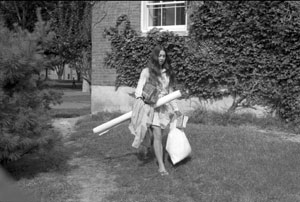Though women matriculated at Bowdoin beginning in 1971, the process of coeducation was exactly that: a process. These documents reveal responses to and issues with coeducation from 1968 to 1975.

The implementation of coeducation at Bowdoin began long before the arrival of women in the fall of 1971, and the process continued for years after. This section provides a variety of sources documenting this dynamic time period at Bowdoin, from a professor’s letter in 1968 strongly advocating for full coeducation at Bowdoin, to Deborah Mann’s 1975 commencement address offering insight into the day-to-day struggles of women at the college and hoped-for improvements for the future.
For some time after the initiation of coeducation, the College administration found that there was a great deal more to do to prepare the campus to accommodate women. Learn about how the administration and women students themselves anticipated and then attempted to meet women’s, and men’s, housing, security, and healthcare needs.
In this section you will also find some of the discourse that surrounded these changes, including perspectives from male and female students, administrators, and faculty, who express their sentiments through a variety of avenues. The documents give insight into the general attitude toward coeducation as it was being implemented, and they help paint a picture of what it was like to be a woman on this campus in the earliest years of coeducation: what worked well and what did not as this small college underwent large changes.